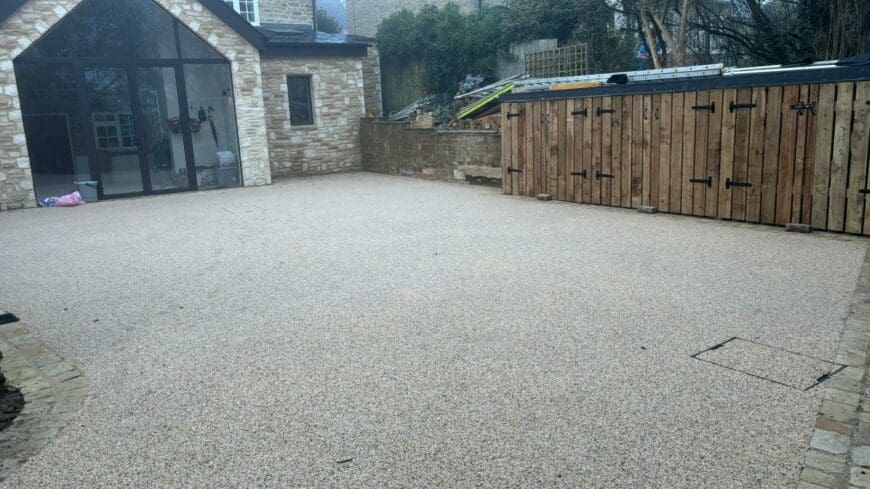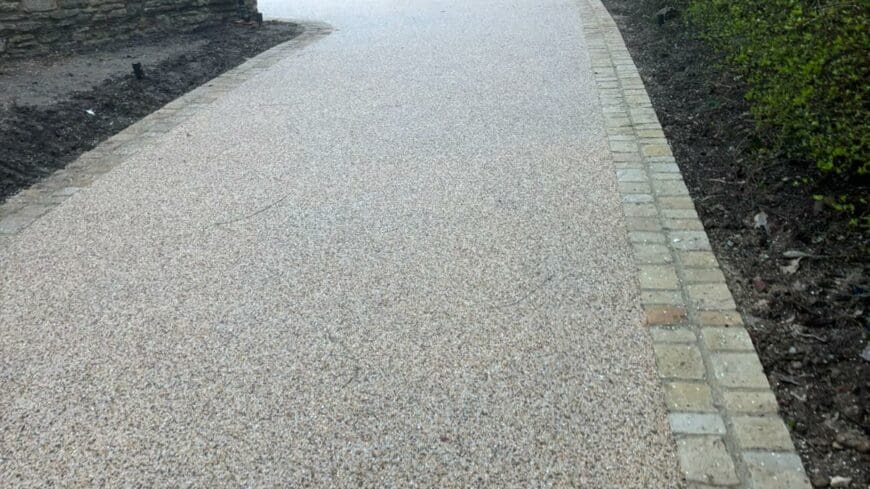The Pros and Cons of Resin Driveways: As Told by Experts
Here at M&C Driveways, Resin Driveway Installation is one of our most popular services, perfect for all arrays of property and preferences. They offer a fresh and pristine look alongside the added value it brings, which has lead to its increase in popularity.
Our team of experts will provide a balanced view of the benefits and drawbacks of resin driveways, helping you select the optimal solution for your specific property requirements. Below are also examples of our work.
Pros of Resin Driveways
- Aesthetic Appeal:
- Variety of Designs and Colors: Resin driveways offer a wide range of colors and design possibilities, allowing for customisation that complements the style of your property.
- Smooth, Sleek Finish: The smooth surface provides a modern and attractive appearance, enhancing the curb appeal of your home.
- Durability and Longevity:
- Resilient to Weather Conditions: Resin driveways are resistant to cracking and can withstand extreme temperatures, both hot and cold, without deteriorating.
- UV Stability: Many resin driveways are UV-stable, meaning they won’t fade or discolor when exposed to sunlight, maintaining their appearance over time.
- Low Maintenance:
- Minimal Upkeep Required: Resin surfaces are easy to clean, usually requiring just occasional sweeping or power washing to maintain their look.
- Weed and Moss Resistance: The tightly bound surface of a resin driveway prevents weeds and moss from growing through, reducing the need for chemical treatments or regular weeding.
- Permeability:
- Sustainable Drainage: Resin-bound driveways are porous, allowing water to drain through the surface, which reduces the risk of flooding and helps with natural water management.
- Compliance with Regulations: In many areas, permeable surfaces are required to meet building regulations, and resin driveways can help in complying with these requirements.
- Safety Features:
- Anti-Slip Surface: When installed correctly, resin driveways provide a slip-resistant surface, making them safer for walking or driving on, even in wet conditions.
Cons of Resin Driveways
- Initial Cost:
- Higher Upfront Expense: Resin driveways can be more expensive to install compared to other options like gravel or tarmac, particularly when choosing high-quality materials and professional installation.
- Potential for Surface Damage:
- Susceptibility to Staining: Resin surfaces can be prone to staining from oils, fuels, or other chemicals if not promptly cleaned, which might require specific cleaners to remove.
- Vulnerability to Heavy Loads: If not properly installed with a suitable base, resin driveways may suffer from indentations or damage under the weight of heavy vehicles or consistent heavy traffic.
- Installation Challenges:
- Requirement for Professional Installation: Proper installation of a resin driveway requires skill and experience to ensure durability and aesthetics, which may limit DIY options.
- Weather-Dependent Installation: Resin driveways need to be installed under specific weather conditions. High humidity or rain during installation can affect the curing process and the final quality of the driveway.
- Maintenance of Permeability:
- Clogging of Pores: Over time, the porous nature of resin driveways can lead to the pores becoming clogged with dirt, debris, or algae, which may reduce its permeability and necessitate periodic professional cleaning.
- Not Suitable for All Surfaces:
- Base Preparation Requirements: A resin driveway requires a stable and solid base, such as concrete or tarmac. Installing over an unsuitable base can lead to issues with cracking or uneven surfaces.




